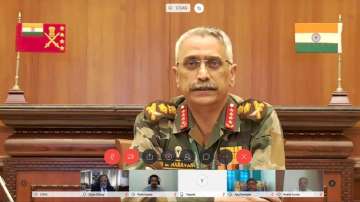They [Nepal] may have raised the issue (of Lipulekh road construction) at the behest of someone else, Indian Army Chief General MM Naravane has reckoned, in a veiled attack on China, which he refused to directly refer to in his remarks. The comments by the Indian Army chief came during a webinar organised by the Manohar Parrikar Institute of Defence and Analysis (IDSA), a think tank under the aegis of the Ministry of Defence.
“I do not see any contradiction at all. The Nepal ambassador has said area east of the river (Kalapani) is theirs. And the road is west of it. So I don’t know what they (Nepal) are agitating about," said Naravane.
"There are issues of where the tri-junction should be. They [Nepal] may have raised the issue at the behest of someone else," said the Army chief.
On May 9, Kathmandu had called upon India to refrain from carrying out activity "inside the territory of Nepal,” a day after Union Defence Minister Rajnath Singh unveiled a shorter route to the holy site of Kailash Mansarovar, which passes through Lipulekh in Nepal.
“This unilateral act runs against the understanding reached between the two countries including at the level of Prime Ministers that a solution to boundary issues would be sought through negotiation,” a statement by Nepal’s foreign ministry said.
“The Government of Nepal remains committed to seeking diplomatic solution to boundary issues on the basis of the historical treaty, documents, facts and maps in keeping with the spirit of close and friendly ties between the two countries,” the statement added.
Lipulekh, one of the places through where the road passes, has been claimed by Nepal as its integral part. India and China, however, consider the place as a tri-junction of the three countries.
The Border Roads Organisation (BRO) finished off work on the Ghatiabgarh-Lipulekh road on April 17, which would effectively reduce the travel distance from Delhi to the pass to two days from the existing duration of three days.
“The Government of Nepal has consistently maintained that as per the Sugauli Treaty (1816), all the territories east of Kali (Mahakali) River, including Limpiyadhura, Kalapani and Lipu Lekh, belong to Nepal,” Kathmandu had said in its protest statement.
Latest India News
